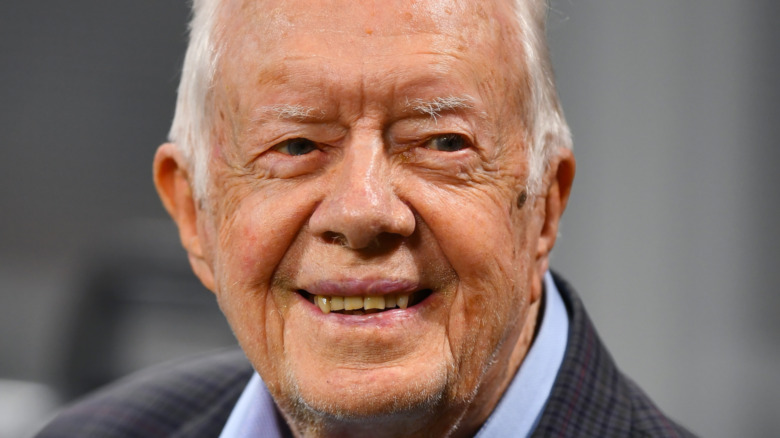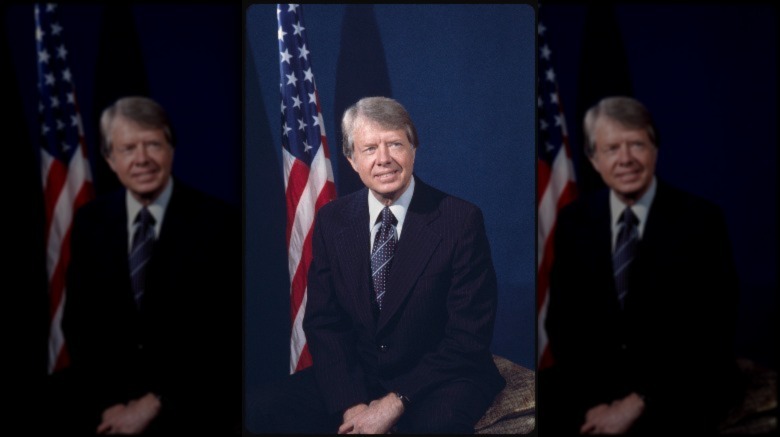39th US President Jimmy Carter Dead At 100
On December 29, 2024, the United States said goodbye to its oldest living president, President Jimmy Carter, who served as commander-in-chief from 1977 to 1981. He was 100 years old. The former president's death was announced by his son, James E. Carter III (via Washington Post).
In mid-February 2023, The Carter Center provided an update on the former president. It read, "After a series of short hospital stays, former U.S. President Jimmy Carter today decided to spend his remaining time at home with his family and receive hospice care instead of additional medical intervention. He has the full support of his family and his medical team. The Carter family asks for privacy during this time and is grateful for the concern shown by his many admirers."
In the last years of his life, President Carter experienced quite a few serious health conditions, but was declared cancer-free in 2015 following treatment for melanoma, which had spread to his brain and liver (via CNN). During his cancer treatment, he refused to give up his Sunday school teaching duties (via The New York Times). He also had surgery several years later to relieve pressure on his brain (via CNN). He also experienced falls several times, requiring medical care and stitches to patch him up, but he enjoyed being active and involved until very recently — for example, he was unable to travel to attend President Biden's inauguration in 2021, but Biden did pay him a visit a few months later (this was notable as Biden was the first sitting president to visit the Carters in their home).
The 39th president of the United States
Even though President Carter only served one term, he's credited with "restoring the balance to the constitutional system after the excesses of the Johnson and Nixon 'imperial presidency,'" as the Miller Center at the University of Virginia says. He carried into the White House lessons he learned as Governor of Georgia from 1971 to 1975, his home state, which were the same lessons he took with him from family peanut businesses, Carter Farms and Carter Warehouses. Namely, President Carter was characterized by modesty, empathy, informality, and a rejection of pork-barrel politics. He refused to be carted around in a limousine on Inauguration Day, often addressed the nation wearing a cardigan, hated backroom political dealings, pardoned Vietnam-era draft dodgers (per the Miller Center), and his entire life lived in the same home he bought in 1961, now worth $167,000 (per CNBC).
Carter's administration was known for increasing jobs upwards of an additional 8 million nationwide, and the national budget deficit fell during his four years in the Oval Office. He was responsible for the creation of the Department of Education and was known for his efforts to increase diversity in the government workforce.
Unfortunately, the Carter administration was plagued by Congressional pettiness, national energy crises, and the Soviet invasion of Afghanistan in 1979. The Iran hostage crisis (and his administration's response to it) was considered a factor in why he lost re-election in 1980 (via Office of the Historian).
President Carter's later life, though, would see him fulfill his humanitarian ambitions.
A history of human rights activism and clean water initiatives
James Earl Carter, Jr. was born in Plains, Georgia, in 1942, to a devout Baptist family. As The White House states, President Carter entered state politics in 1962 after serving in the Navy for seven years, following his graduation from the Naval Academy in Annapolis, Maryland, in 1946, and marrying his lifelong partner, Rosalynn, who died in 2023 at the age of 96 (via The Carter Center). His presidential desire to make government "competent and compassionate" was poorly received at a historically contentious time, particularly his championing of human rights.
Not one to be waylaid, President Carter and his wife founded The Carter Center in 1982, shortly after his presidency ended. The center's tagline, as its website says, is, "Waging Peace. Fighting Disease. Building Hope," is no pie-in-the-sky phrasing. The Carter Center has almost completely, by itself, been responsible for the eradication of Guinea worm, a horrifying disease that afflicted African nations for decades, whereby crustaceans in infected water lay eggs inside the human body, and meters-long worms burrow out through the flesh (via The Carter Center). There were 3.5 million cases in 1980, as NPR tells us. In 2016 there were only two. As President Carter said, "No one else was addressing the disease," so he decided to take care of it. And so, over 30 years the Carter Center contacted 203,600 villages to teach them about water filtration, sanitation, and medical practices.
During his presidency, President Carter also preserved 157 million acres of the natural lands in the United States, and he's well known for his direct, hands-on involvement with Habitat for Humanity.
Carter was preceded in death by his wife, Rosalynn, and his grandson, Jeremy. He was survived by his four children — John William "Jack," Donnel Jeffrey "Jeff," James Earl "Chip," and Amy Lynn — and 22 grandchildren and great-grandchildren.


